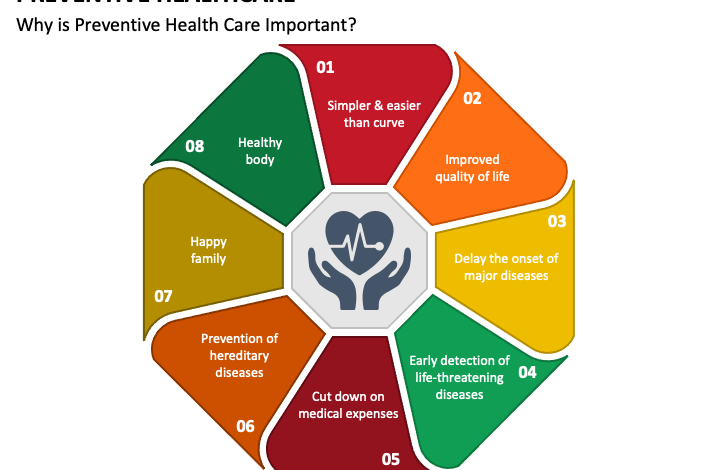Staying Healthy: Proactive Steps for Long-Term Wellness

Taking Charge of Your Well-being: A Deep Dive into Preventative Health
In today’s fast-paced world, it’s easy to get caught up in reacting to illness rather than preventing it. We often wait until we feel unwell to seek medical attention, but a growing body of evidence highlights the incredible power of preventative health strategies. This isn’t just about avoiding sickness; it’s about actively cultivating long-term well-being and maximizing your quality of life for years to come. Let’s explore what preventative health truly means and how you can incorporate these crucial practices into your daily routine.
What Exactly is Preventative Health?
Preventative health encompasses a broad range of actions taken to proactively avoid illness, detect problems early, and generally maintain optimal health. It’s about shifting the focus from reactive care (treating an existing condition) to proactive measures that reduce your risk of developing diseases in the first place. Think of it as investing in your future self – laying a solid foundation for long-term vitality.
Unlike simply treating symptoms, preventative health addresses the root causes of many common ailments. This often involves lifestyle modifications and regular screenings to identify potential issues before they become serious problems. It’s about empowering individuals to take control of their own health destiny.
Key Pillars of Preventative Health
Preventative health isn’t a single strategy; it’s a multifaceted approach built on several key pillars. Let’s break down the most impactful areas:
1. Nutrition: Fueling Your Body for Success
Diet plays a monumental role in both preventing and managing disease. A diet rich in fruits, vegetables, whole grains, and lean protein provides your body with the nutrients it needs to function optimally and build resilience against illness. Conversely, diets high in processed foods, sugar, and unhealthy fats are linked to an increased risk of chronic diseases like heart disease, type 2 diabetes, and certain cancers.

Consider these dietary recommendations:
- Embrace the Rainbow: Aim for a variety of colorful fruits and vegetables daily.
- Choose Whole Grains: Opt for whole wheat bread, brown rice, and oats over refined grains.
- Lean Protein Sources: Include fish, poultry, beans, and lentils in your diet.
- Healthy Fats are Essential: Incorporate sources like avocados, nuts, seeds, and olive oil.
- Limit Processed Foods & Sugary Drinks: Reduce your intake of sugary drinks, processed snacks, and fast food.
2. Regular Physical Activity: Moving Your Way to Better Health
The benefits of physical activity extend far beyond just weight management. Regular exercise strengthens your cardiovascular system, boosts your immune function, improves mood, and reduces the risk of numerous chronic diseases. It’s recommended that adults aim for at least 150 minutes of moderate-intensity aerobic activity or 75 minutes of vigorous-intensity activity per week, plus strength training exercises at least two days a week.
Find activities you enjoy – whether it’s walking, swimming, dancing, cycling, or playing sports – to make exercise a sustainable part of your routine. Even small amounts of daily movement can make a difference!
3. Adequate Sleep: The Often-Overlooked Healer
Sleep is not just about feeling rested; it’s a vital biological process that allows your body and mind to repair and rejuvenate themselves. Chronic sleep deprivation weakens the immune system, impairs cognitive function, increases the risk of accidents, and contributes to various health problems. Aim for 7-9 hours of quality sleep each night.
To improve your sleep hygiene:
- Establish a Regular Sleep Schedule: Go to bed and wake up around the same time each day, even on weekends.
- Create a Relaxing Bedtime Routine: Wind down with a warm bath, reading, or meditation.
- Optimize Your Sleep Environment: Ensure your bedroom is dark, quiet, and cool.
- Avoid Caffeine & Alcohol Before Bed: These substances can interfere with sleep quality.
4. Stress Management: Taming the Inner Beast
Chronic stress takes a significant toll on both physical and mental health. It can contribute to high blood pressure, weakened immunity, anxiety, and depression. Learning effective stress management techniques is crucial for preventative health.
Explore various stress-reducing strategies such as:
- Mindfulness Meditation: Practices that focus on the present moment.
- Yoga & Tai Chi: Combining physical activity with mindful breathing.
- Spending Time in Nature: Exposure to natural environments has been shown to reduce stress levels.
- Connecting with Loved Ones: Social support can buffer against the negative effects of stress.
5. Regular Health Screenings & Vaccinations
Early detection is key when it comes to many diseases. Routine health screenings and vaccinations are vital components of preventative care. The specific screenings you need will vary depending on your age, gender, family history, and risk factors.
Common Preventative Screenings:
- Blood Pressure Checks: Regularly monitor your blood pressure to detect hypertension early.
- Cholesterol Screening: Assess your cholesterol levels to reduce the risk of heart disease.
- Cancer Screenings: Mammograms, Pap smears, colonoscopies, and prostate exams are crucial for early cancer detection.
- Diabetes Screening: Especially important if you have a family history or risk factors for diabetes.
- Vaccinations: Stay up-to-date on recommended vaccinations to protect against preventable diseases.
The Long-Term Benefits of Preventative Health
Investing in preventative health offers numerous long-term benefits, including:
- Reduced Risk of Chronic Diseases: Lower your chances of developing heart disease, stroke, diabetes, and cancer.
- Improved Quality of Life: Experience greater energy levels, better mood, and increased overall well-being.
- Increased Longevity: Live a longer, healthier life.
- Reduced Healthcare Costs: Preventative measures can often save money on healthcare expenses in the long run.
Conclusion: Your Health is Your Responsibility
Preventative health isn’t just about avoiding illness; it’s about actively cultivating a vibrant and fulfilling life. By adopting these strategies, you are taking ownership of your well-being and investing in a healthier future for yourself. Start small, make gradual changes, and remember that every step you take towards preventative health is a positive investment in your long-term quality of life. Don’t wait until you’re unwell – start prioritizing your health today!



